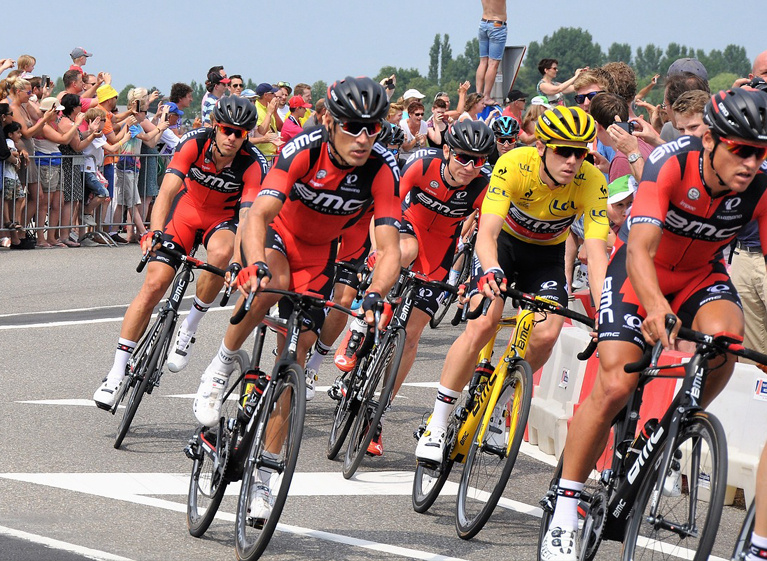Inside the Peloton: Exploring the Tour de France
- Posted on
- By Alana Machado @ 360 Cycles
- Posted in Grand Tours, Road Racing, Tour De France
- 0

If you're not familiar with cycling, the Tour de France may seem like a mystery. But don't worry; we're here to take you on an exciting journey through the history, excitement, and significance of this legendary cycling competition. Put on your helmet and join us as we explore why the Tour of France is celebrated as the ultimate cycling event on the planet.
Origins and Evolution
The Tour de France has a long history that began in 1903. It was conceived by journalist Geo Lefevre and editor Henri Desgrange born out of a desire to boost circulation for the newspaper L'Auto. Little did they know that their idea would evolve into the iconic event we know today.
The first edition of the Tour de France kicked off on July 1, 1903, with 60 brave cyclists embarking on a gruelling journey from Paris. Over the course of 2,400 kilometres and 19 stages, Maurice Garin of France emerged as the winner, making a name for himself in cycling history.
Despite challenges like cheating and sabotage, the Tour de France persisted. In 1905, mountain stages were introduced, adding even more difficulty. The race has been held every year since, except during the war years of 1915-1918 and 1940-1946. It continues to captivate audiences worldwide.
The Ultimate Test of Endurance
What sets the Tour de France apart from other sporting events is its unique format and the sheer physical and mental challenges it presents. The race spans approximately 3,660 kilometres and consists of 20 stages, each with its own obstacles and opportunities.
The competition awards different jerseys to leaders in various categories. The coveted yellow jersey, or "maillot jaune," is worn by the overall leader. The green jersey, or "maillot vert," is awarded to the winner of each stage. The polka dot jersey, or "maillot a pois," is given to the best climber, while the white jersey, or "maillot blanc," is reserved for the best young competitor.
Contrary to popular belief, winning individual stages does not guarantee overall victory. The ultimate champion is the cyclist who achieves the lowest cumulative time throughout the race. This means consistent performance across all stages is crucial, regardless of specialisation in flat stretches or mountainous terrain.
It's important to note that not all participants have an equal chance of winning. Cyclists compete as part of a team, with designated team leaders and supporting members. The team leaders, chosen before the race begins, have a higher likelihood of securing victory, thanks to the strategic support of their teammates. This dynamic adds a layer of complexity and teamwork to the Tour de France.
The Art of Tactics and Strategy
Watching the Tour de France is not just about witnessing physical prowess; it's also an opportunity to appreciate the tactical prowess and psychological battles that unfold on the road. Each stage is akin to a game of chess, with competitors strategically deciding when to push ahead and when to conserve energy.
One crucial aspect of the strategy is understanding the concept of drafting. Cyclists in the peloton, the main pack, benefit from reduced wind resistance, allowing them to save up to 50% of their energy. However, those who break away from the pack often find themselves fatigued and eventually caught up by the main group.
Cyclists maintain constant radio communication with their support vehicles to make informed decisions. These vehicles provide crucial information and guidance, making the race far from a solitary endeavour. Alongside the support vehicles, television motorbikes and helicopters capture the action while enthusiastic crowds line the route, creating an electric atmosphere.
A Legacy of Champions
Over the years, the Tour de France has crowned numerous champions, each leaving their mark on the history of the race. From the early pioneers like Maurice Garin and Lucien Petit-Breton to modern-day legends such as Eddy Merckx and Chris Froome, the list of winners reads like a who's who of cycling greatness.
These champions have become household names and inspirations for aspiring cyclists worldwide. Their triumphs and struggles epitomise the relentless pursuit of excellence, making the Tour of France a symbol of human achievement and endurance.
Join the Spectacle
The Tour de France is not just a race; it's a celebration of sport, camaraderie, and the beauty of France. Every year, millions of spectators from around the globe gather to witness this grand spectacle firsthand. The race weaves through picturesque landscapes, charming villages, and historic landmarks, showcasing the beauty and diversity of the French countryside.
If you're looking for a unique and thrilling experience, consider planning your vacation around the Tour de France. Immerse yourself in the electric atmosphere, cheer on your favourite cyclists, and soak in this iconic event's rich history and culture.
To enhance your understanding of the competition and its inner workings, you can even watch "Tour de France: Unchained" on Netflix.
This year, mark your calendars for July 1st, as the Tour de France takes centre stage. It's the perfect opportunity to witness the excitement and drama unfold before your eyes. Join the global community united by their love for the Tour ed France - the greatest cycling contest on earth. So grab your binoculars, be ready, and get ready to experience the thrill of this legendary race.
Additional Information:
■ The Tour de France has become a global phenomenon, with millions of viewers tuning in from all around the world to witness the drama and excitement.
■ The race has faced its fair share of controversies and scandals throughout history. Still, it has always managed to bounce back and capture the imagination of cycling enthusiasts.
■ The Tour de France has also become a platform for promoting environmental sustainability and raising awareness about climate change. Initiatives like "Green Jersey for a Green Planet" highlight the importance of preserving natural resources and minimising the race's ecological footprint.
■ The economic impact of the Tour de France is significant, with host cities and regions benefiting from increased tourism and exposure. The race generates billions of euros in revenue. It provides a platform for showcasing the beauty and cultural heritage of different regions of France.
Photo Cover of the Post by keesluising on Pixabay











Comments
Be the first to comment...